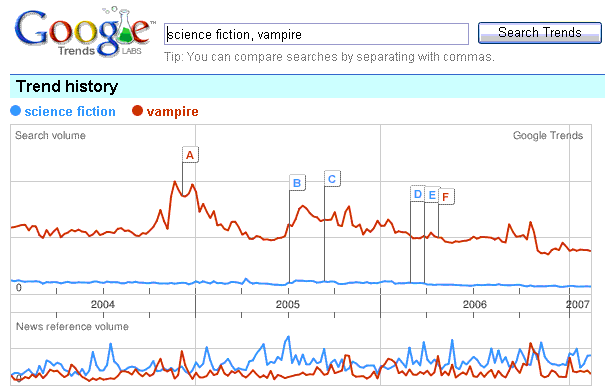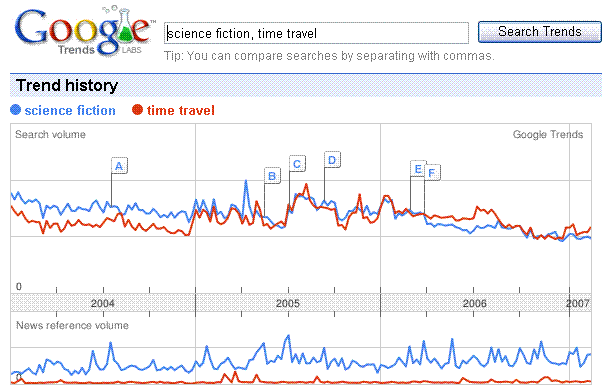This first trend is science fiction vs. vampire, sci fi drawn in a friendly light blue and vampire in blood red.

Vampire, unfortunately, is kicking science fiction's behind, though of course, a lot of those vampire related searches are non-fiction:-) Strangely, the much maligned mainstream media had fewer stories about vampires than about science fiction. The next trend shows science fiction vs time travel.

Recently, time travel has gotten more internet search activity than science fiction, which implies that much of the interest in sci fi is disguised in other search terms. Which is a good time to point out that I didn't include trends with either "sci fi" or "SciFi" because both are closely associated with the SciFi cable channel, which is a different beast altogether. Now that I think about it, I watched quite a few episodes of Babylon 5 when it was on in the mid-90's and I had a television. Good show, whoever created it.
But what none of my correspondents mentioned, probably because they are all in their middle age on up, is the impact of video games on what was once a core demographic group for science fiction. I wouldn't be surprised if a lot of the apparent lack of interest in reading spaceship and alien encounters type sci fi is due to the availability of games and gaming counsels that soak up the same free time. With the rise of multi-player games, playing at science fiction is arguably a more social activity than reading it, even if that social time is largely taken up with killing and destroying stuff.
I'm not trying to say that I'm an old man, but I know kids who play video games and I don't get what makes them tick, so trying to publish science fiction for them wouldn't be too smart. That leaves the thinking man's science fiction or literary sci fi, for the sci fi retro crowd. At the moment, I have no idea how big or tiny that crowd is, but I've started grinding the wheels of research so hopefully I'll have a better take on it by the end of June.
4 comments:
Morris,
I think you're over-analyzing the market. In fact, there is no genre of book that will bring you a hundred percent success, no matter how high your word searches score on Google. I have a hunch that if your sci-fi anthology is good, you'll go against historical numbers and make new Google search history. As my mother might have said, "If you believe in it, just do it."
Randy@savemydreams.com
www.savemydreams.com/news
Randy,
From the standpoint of a reader or a writer, I have no doubt that you're correct. From the standpoint of the publisher, analyzing the market is a big part of the puzzle. I know way too many small publishers who have gone ahead with projects with a minimum of market analysis (often zero) in the theory that there's always a place for a good book.
I believe (and I may be wrong) that the main reason small publishers and self publishing authors are so resistant to doing market research is that they don't want to discover that the market for their pet project or labor of love is very small. While there are certain advantages to publishing books for a niche audience, if the niche is too small, you start needing a scary high adoption rate just to break even.
Morris
Risk, innovation, and a safe bet may intersect, but usually not. The beauty of being a small press, especially a micropress, is that the risk of exploring these options is palatable.
Randy
Randy,
I think your choice of words, "palatable", gets to the crux of my previous comment. I haven't jumped over to Google to check, but my own definition of palatable would be something like "tasty" or "tempting".
Some micropresses are run as hobbies or as sidelines to otherwise profitable businesses. It's a good thing that some of those people are out there publishing sometimes great books, but I've never tried to reach them through this blog. I try to stick with business, about making a living. A publisher who gets too caught up in having fun or seeking new challenges can end up out of business in a hurry.
Again and again I've heard through my usual e-mail channels, "I've read everything you've written about publishing and I'm going to utilize it all with my NEXT title, but this one transcends all that." I don't recall one of those publishers having a success or ever getting to a second title, though I can't claim I've made an effort to keep track.
While the On Demand printing model helps reduce costs and risks, it doesn't do anything to reduce the primary costs for either a publishers or self publishing authors, which are book production (authoring, editorial, design, and market research) and marketing.
I've written a couple books that have been labeled innovative, but I didn't publish any of them on paper before seeing serious demand for them through my website. If your argument is, "It's impossible to predict the success or failure of a title with a high degree of certainty so it's not worth making a serious effort to try", I have to disagree.
Morris
Post a Comment